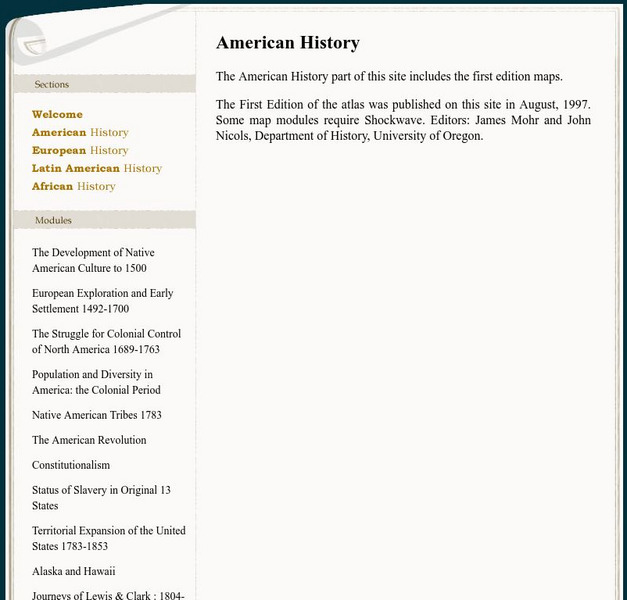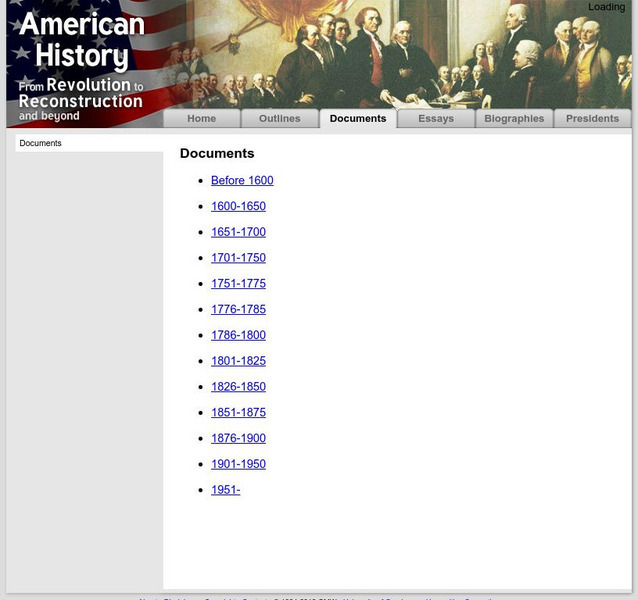Hi, what do you want to do?
Curated OER
Declaration of Independence
Eighth graders explain the meaning of the Declaration of Independence. They view a political cartoon of the period, then do a writing assignment for homework. They write about how they would feel if the British were calling them traitors.
Curated OER
Newspaper Time
Eighth graders complete a newspaper article as a part of their exam review for the Revolutionary War. Using information gathered over the course of the unit, 8th graders create their own newspaper reflecting the facts and ideas of the...
Curated OER
Social Studies: Debating Aid to Micronesia
Students simulate a debate about continued U.S. aid to the Federated States of Micronesia. In two large groups, they research the history of Micronesia and how it was affected by colonization and trusteeship. After the debate, students...
Curated OER
Thanksgiving and Agriculture
Students listen to the book "The Pilgrim Story" and discuss the Pilgrims and why they came to America. Students role play the Thanksgiving story and write about how Pilgrims and Indians relate to them today.
Curated OER
American Immigration Past and Present
Learners simulate a Commission hearing in which the class attempt to arrive at an immigration policy; individual essays by each student; and, if time permits, individual or group projects based on some aspect of America's immigration...
Curated OER
Art of Cynicism
Students analyze selected pieces of art and infer how they reflect a sense of disillusionment, and/or cynicism in American society in the aftermath of the Vietnam War and Watergate scandal. Then they identify and place cultural attitudes...
John F. Kennedy Presidential Library & Museum
Military Advisers in Vietnam: 1963
How did the beginning of the Vietnam War factor into the Cold War with the Soviet Union? As part of a study of American involvement in Vietnam, class members read a letter address to President Kennedy and his response in which...
Curated OER
1986 Capsule: Hispanic Influence in the New World
Students research the conditions in Spain during the 15th and 16th centuries. In groups, they write a paper on the information they gathered during their research and why the situation is unique to Spain. As a class, they discuss the...
Curated OER
Centers of the Storm: The Lyceum and the Circle at the University of Mississippi
Greek Revival architecture and the Civil Rights Movement? Sure! Examine how the Lyceum and Circle, two historic buildings located on the campus of the University of Mississippi, relate to integration and the 1962 riot on the university...
Curated OER
Wild Moving Lizard Sculpture
Lizards are amazing! After a lesson on reptiles, take a look at this set of instructions. You'll be able to guide your class in making a paper lizard sculpture that moves. This idea also includes variations on the paper technique used...
Curated OER
My Place In Time
Sixth graders interpret Franklin's style, his ease of writing and content, using this to inspire, motivate and guide them to do more writing. They list Franklin's civic accomplishments and political accomplishments. They name 4...
Curated OER
Conflict On The Plains
Eighth graders investigate the culture and lifestyles of the Lakota Sioux and the Northern Cheyenne tribes. They use a variety of resources for research. They create questions based on information to be used during classroom discussion...
Curated OER
Rules, Resistance and Repeal: How the Stamp Act Was Repealed
Eighth graders examine the causes of the American Revolution. Participating in activities, they discover how it would have felt to be taxed without representation. They identify an object from a museum and discuss how it might have been...
Khan Academy
Khan Academy: Ap Us History Unit: Period 7: 1890 1945: Intro.: Age of Empire
The study resource from Khan Academy provides an overview of Period 7: 1890-1945 in American History. The Age of Empire is discussed in this lesson. This resource is designed as a review for the AP US History Test.
Georgia Department of Education
Ga Virtual Learning: Us History: The American Revolution
US History learning module on the American Revolution with interactive assignments, projects, and assessment.
Gilder Lehrman Institute of American History
Gilder Lehrman Institute: Ap Us History Study Guide, Period Two: 1607 1754
[Free Registration/Login Required] Advanced placement U.S. History learning module on the emerging colonial and native societies between 1607-1754. Resources for students include video, essays, timeline and primary source documents.
University of Oregon
Mapping History: American History
Interactive and animated maps and timelines of historical events and time periods in American history from pre-European times until post-World War II.
Khan Academy
Khan Academy: Us History: 1491 1607: Quiz 2
A quick, five question quiz over the Columbian Exchange, Spanish conquest, and the Spanish Colonial system.
Khan Academy
Khan Academy: Us History: 1491 1607: Spanish Conquistadores and Colonial Empire
The Spanish gained an early foothold in the colonies, quickly becoming the most powerful European power in the New World.
Khan Academy
Khan Academy: Us History: 1491 1607: Environmental/health Effects in New World
European arrival in the Americas decimated both indigenous people and previously-flourishing ecosystems.
Khan Academy
Khan Academy: Us History: 1491 1607: African Societies and Atlantic Slave Trade
The beginning of the Atlantic slave trade uprooted previously established societal norms in West Africa.
Smithsonian Institution
National Museum of American History: Within These Walls
Two hundred years' worth of American history all in one house. Learn what a close examination of a single-family dwelling can tell us about what life was like during five different periods of American history: the colonial era, the...
University of Groningen
American History: Documents: Documents
Browse U.S. historical documents according to historical period or search documents via search engine.W.11-12.9b US Doc Analysis
Khan Academy
Khan Academy: Labor, Slavery, and Caste in the Spanish Colonial System
A self-evaluation using primary sources assesses labor, slavery, and caste in the Spanish colonial system.




























